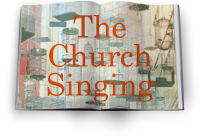Music and Meaning: All Forms Are Valid
Editor’s note:
We asked Harold Best and Ken Myers the same three questions:
- Can God employ any musical form for redemptive purposes?
- Even if God can employ any musical form redemptively, are some musical forms spiritually or morally “better” than others?
- Are some musical forms “better” for the sake of the gathered church?
Click here for Myers’ answer. Best’s answer is below:
My answers to these questions derive from principle, not the music I love, like, tolerate, or loathe.
CAN GOD EMPLOY ANY MUSICAL FORM?
Can God employ any musical form for redemptive purposes? Yes he can, but note the following:
First, there are possible implications in the question that need clarification.
(1) The question seems to imply that some forms might be more useful to God than others based on assumed aesthetic or moral qualities. But this cannot be allowed, for two reasons. First, God doesn’t judge music; he judges people for the reasons they make and use it. Second, christianized choices about acceptable music have never been stable: one generation’s trash becomes another’s treasure. Examples of this are too many to count. Meanwhile, in Luther’s words, the gospel runs its course. But this does not mean that there should be no debate. Rather, the nature of the debate needs changing from philosophized theology to biblical theology.
(2) The question seems to imply that God might have to work harder with music x than music y because x is unfamiliar, overly complex, or overly simplistic, while y meets all “relevance” criteria. But this is flawed: God needs no outside leverage in doing his work. If he did, he surrenders his omnipotence.
Second, viewing the above from another angle, forms or genres are no more unredeemed or redeemed than a mountain sunset or a computer or a jazz tune. Who does God redeem? It’s humanity, uniquely imago Dei, the only save-able or lose-able entity in the creation. Because of the resurrected Christ, the redeemed are the only ones who by faith and in hope are already participants in the new creation.
The template is clear: God saves people, and uses created things in whatever way he pleases. It is in this sense that the rest of creation, dumb to redemption itself—camels and cathedrals can’t be saved—awaits re-creation. Artifacts—sunsets, computers, jazz tunes—remain themselves and are no-things outside of themselves. In all of their self-enclosed meaningfulness, they simply function as themselves, contingently pointing away from themselves to the One, the Truth, who alone redeems.
There are important principles at work here. The Creator is not the creation. The alternative is pantheism. Further, the creation could not make itself, but had to be made. And by being made, it is both less than, and under submission to, the sovereignty of the Maker. Let’s take this one step further. According to Scripture, God granted humankind extraordinary sovereignty over what he made, and by extension, over what it makes. Music does not make itself. We bring it into being, and it is neither one with us (we are not the music) nor empowered over us. If we allow this order to be reversed, the result is inevitable: We become shaped by what we have shaped and by allowing this, have turned to idolatry. But if music is in submission to us and not the reverse, we offer it freely as an act of worship—no more and no less—and are thus delivered from depending on it as a cause of worship. Even when we talk about music being an aid to, or tool for, worship, we are flirting with sovereignty-reversal, especially in this culture of narcissism and power mongering. Furthermore, if I look to music as an aid, and end up in a worship service where the music is stylistically upsetting or even offensive, does it then become an aid to non-worship? Not as long as I understand that the Holy Spirit is the sovereign Aid to worship, who can neutralize any temporary circumstance. Likewise, if I find myself in a musical setting that is rhapsodically wonderful, I must remember that the beauty of the music cannot approach the glory and wonder of Almighty God.
Third, the term “musical form” is benignly abstract. Take the following constructs:
- blah-62-blah;
- the nation’s Capitol Building;
- %+%;
- minuet-trio-minuet.
They are all in the same ABA (ternary) form but each is essentially different and differently shaped.
To live in a world of “forms” is to live in a world of essentialized dis-reality. By contrast, to live in a universe of nearly infinite shapes, each one real in itself, is quintessentially biblical. A pine tree is not a manifestation of an idealized pine tree, for there is no such thing “out there.”
God’s way is this way: each pine tree is an individualized completeness, good-in-itself. And while all pine trees are God’s personal handiwork, one pine tree can be more beautiful or crooked or symmetrical than another one. Meanwhile the Creator declares each one “good.” Further, a pine tree cannot be ultimately said to be more beautiful than a red-winged blackbird, even though one blackbird can be more beautiful than another.
At the musical level, the beauty of a jazz improvisation cannot be said to better a Renaissance motet, even though one jazz improvisation (or motet) can be deemed better than another. And if we want to insert the concept of taste into these examples, taste is the arbitrary exercise of deciding-among. Meanwhile, intrinsic worth is a given while quality varies.
ARE SOME MUSICAL FORMS “BETTER” THAN OTHERS?
Even if God can employ any musical form redemptively, are some musical forms spiritually or morally “better” than others?
The quick answer is “no,” but the question deserves further consideration. I have no idea what “better” means except in a relative sense: x can be better than y even though x is never perfect. To complicate things, we often cross wires by using “better” in a moral sense, thus confusing taste and purity.
The Scherzo in Beethoven’s Ninth Symphony is in simple ternary form, as are a thousand third-movement works in as many classical compositions. The Beethoven is better by far, but is it better than the second movement of Brahms’ German Requiem, also in ternary form? Who’s to say? I can’t.
However, I can say this: the most mediocre ternary form imaginable among those thousand compositions has intrinsic goodness and can be as spiritual as any choosing heart might say. Quality is a matter of taste, which, even among the most practiced connoisseurs, is straightforwardly arguable. And I disagree with those who bring taste—as important as it is in its comparative domain—into matters of spirituality. For who among them is expert enough to test the subtle nuances of sheer goodness without dipping into extremist comparatives: “good taste/bad taste”; “art/non-art”; “morally good/morally bad”?
God nowhere defines spiritual music, but he is unequivocal about what a spiritual person inwardly is, irrespective of the “betterness” of a cultural artifact. St. Paul, in talking about “spiritual songs,” certainly meant text types before musical types. Otherwise, the terms “psalms” and “hymns” would imply “other-than-spiritual.”
Furthermore, if we were to speak of something being of better moral quality, we’re fudging, because there are no gradations in true morality. “Fudging” on tax returns is no less immoral than lust for a new Camaro or bed-mate. Sin is sin, both for believers and non-believers. But spirituality is a condition within which increasing christlikeness deepens and cleanses us but in no way lessens the exceeding sinfulness of sin or guarantees sinless perfection.
In short, any construct that even suggests an equation between Truth (absolute) and beauty (variable) walks into a theological morass.
ARE SOME FORMS “BETTER” FOR CHURCH?
Finally, are some musical forms “better” for the sake of the gathered church?
“Better” is the wrong word. “Appropriate” is better. “Better,” as already explained, is relative, whereas “appropriate” in the biblical sense comes as the result of searching among things that are relative to each other.
Deciding among relativities is called discernment. The decision becomes absolute because it derives out of a solemn commitment made to the Lord. But this does not mean that the artifacts are absolutized. Nor does it mean that, as contexts change the artifacts can’t change as God leads. For instance, I would be playing fast and loose with a commandment if I were to ask God for discernment as to whether I drink myself to drunkenness. But I can pray for discernment as to why and how much I drink and with whom I choose to drink, especially if he or she is weaker, in which case, by discernment I abstain from what I know to be good. By the same token, the leadership in any local assembly is free to assume that all available musical options are on the table until, by prayerful discernment, a local template is cut that accords with what is best for that particular community, not in terms of “how to grow a church” or “how to get people to worship” but what informed wisdom demands.
If there are problems with music and the church in today’s culture, it’s not about the latest, newest, strangest, most secularized music, or picking on this or that style in the name of sanctified otherness. It’s about the egregious errors that are regularly anointed by pastors and so-called worship leaders and ecclesiastical analysts.
These errors revolve around giving music—any music in any worship context—far more compartmentalized attention than even the best of it deserves. This is where we, not culture, have become paganized, in mirroring a post-Romanticist, culture-wide addiction to music. We’re talking idolatry, but not just the kind where music is reputed to have the power to change lives—this alone is refutable—but where music, any music, any style, anywhere, becomes indispensable to doing anything and everything, including so-called Christian worship. Far too often, music means worship and worship means music. This is a blatant hook-up between things of the spirit and mere handiwork. And this hook-up takes us down the road to idolatrous pantheism sprinkled with holy water.
In short, if we were to stop our speculations about ideal forms, moral content, and good taste (as if we from our Western, post-Enlightenment duck blind had the only bead on them); if we were to get back to the simple wonder of the sheer fact of music, offered temperately, humbly, imaginatively, servingly, discerningly and in complete surrender to the sovereign Word of God, the conversation would be radically different.









